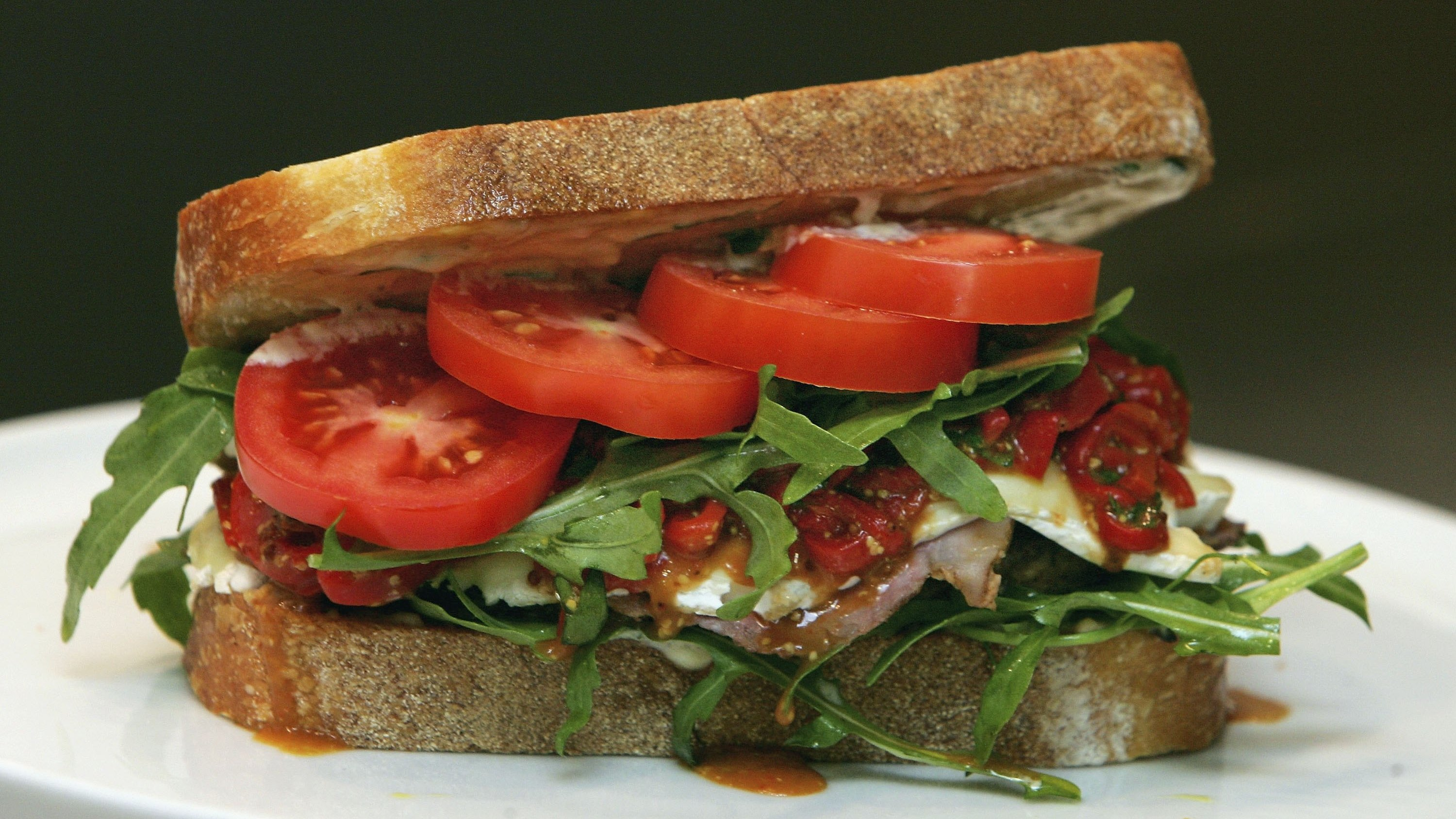Wait, Can You Copyright A Sandwich?
Chad Gunderson of Half Brothers Brewing Co. in Grand Forks, North Dakota, just wanted to sell a really cool sandwich.
His brewery is located in a building that once housed a bakery, and he wanted to take advantage of that equipment to make breads and pizzas. He decided to create a sandwich called The Silo, an homage to one of his favorites: the Clubfoot sandwich from The Staggering Ox, a small franchise with a few locations throughout Montana. The Clubfoot and The Silo are notable in their unique construction: The bread is shaped like a vertical Koozie or pipe with its fillings stuffed inside.
All was well until this week, when he got a phone call. It was Keith Clevenger, co-owner of The Staggering Ox, who asked Half Brothers to please stop selling The Silo, which he said violated a trademark The Staggering Ox holds for the Clubfoot. "I could have taken this two different ways: Road one is like, 'Okay, fine, we'll stop selling the sandwich.' Or number two, which a lot of people in Great Falls want us to do, is fight it," Gunderson tells The Takeout. "That could backfire, and we'd be back to where we are now except minus a couple thousand dollars in attorney fees. I just don't want to be that type of business."
Gunderson readily admits to mimicking The Staggering Ox's sandwich, and says he never made any attempts to hide the inspiration behind it. Though he doesn't plan to fight the request to stop serving The Silo, the issue has Grand Forks residents wondering: Can you copyright a sandwich?
Trying to describe our sandwiches is like trying to describe joy or the sunrise. You can't do it justice. pic.twitter.com/ZhpbK4AFAg
— Staggering Ox (@MissoulaOx) August 15, 2015
The Staggering Ox says on its menus the Clubfoot sandwich is trademarked, which only protects its name, according to Chicago-based intellectual property lawyer Dahlia Saper. If the sandwich company wanted to protect the idea of its sandwich, that would be a copyright.
"If there's a weird, very unique artistic element that they can separate from the food itself, then maybe they have a claim," Saper tells The Takeout. "But those [claims] are typically very hard to prove."
Some of the only precedents for this type of scenario come from the world of fine dining. Big-name chefs like Thomas Keller, Wylie Dufresne, David Chang, and Grant Achatz have run into trouble protecting the concepts of some of their iconic dishes. In 2006, chef Robin Wickens of Melbourne, Australia, was publicly accused of stealing the specific concepts and presentations of dishes that included Achatz's Salsify presentation and Chang's 5:10 Egg.
That scandal, though it didn't result in any legal action, raised the question of whether a dish's artistic aspects, not its recipe, could be copyrighted.
"You can't protect the idea for making a sandwich or the way you make a sandwich," Saper says. "Short of a patent, there's no way to protect the methodology behind creating the food item. But a copyright may be able to protect the artistic or aesthetic nature of it."
As a practical example, Dominique Ansel has a registered trademark on his viral dessert sensation, The Cronut. But that hasn't stopped Dunkin' Donuts from selling a ton of its non-portmanteau'd Croissant Donut. This scholarly review from the The John Marshall Review of Intellectual Property poses the question this way:
"Under U.S. copyright law, '[a] sculptural work is copyrightable if it is a work of original authorship fixed in a tangible medium of expression that demonstrates sufficient creativity, and contains artistic aspects that are separable from its utilitarian functions.' Could the plating of Chang's 5:10 Eggs, Achatz's Salsify, or Keller's Salmon Cornet qualify as copyrightable sculptural work?"
If The Staggering Ox were theoretically to pursue legal action against Half Brothers, it would have to prove that the artistic aspect of the Clubfoot's bun is separate from its utilitarian function, its sandwich bun-ness.
"The idea, for example, of putting lettuce around a sandwich and using that as a bun, that's a way of making a sandwich. You can't protect that," says Saper. "But if the bread that you use has someone painstakingly putting a gold and frosting design on it, or something, that might be art that's separate from the element of the food and might be copyrightable."
To be sure, no legal precedent has been set, as none of the aforementioned disputes have been litigated in a court of law. As for the situation in Montana, the point is mostly moot, since Half Brothers' Gunderson says they're just going to scrap The Silo and come up with another sandwich. But the questions the ordeal poses are almost Platonic: Just what, precisely, is the nature of sandwich-ness?
